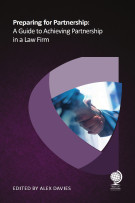
The nature of our profession has changed a lot over the years. There used to be only one legal framework – partnership – which, whether big or small, was built on trust. Covid and technology made it easier for underperforming fee-earners to ‘fly under the radar’ and avoid supervision. It is more difficult for managing and senior partners to tackle these problems. Divided into four parts, this book looks at: the causes of underperformance; its effects on the wider firm and others; how to deal with partner performance issues; and how to manage a firm to achieve better performance.
Underperformance, or poor partner performance, is difficult to challenge. Solicitors are often good at advising other people but not so good at managing themselves. Underperformance is not only about poor profitability, but also risks when cases go wrong or when incorrect decisions are made. This book is very good at encouraging us to analyse these issues and to do something positive to confront them. The writers encourage firms to look at the whole picture and possible causes of problems without being judgemental.
The challenges and advantages of partnerships are nicely summed up: ‘Finding the right balance between the wants and needs of the individual partner and the wants and needs of the wider partnership and firm is very difficult... yet the concept of partnerships (even if it might be packaged within different legal forms) remains the default choice…’ There is a lot in this practical book that is useful.
,





